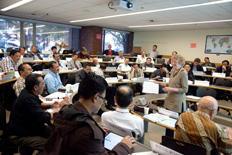By Brenda Ritson
In the final weeks of any semester, I bet almost every HKS professor would be hard pressed to report that his class continues to have full attendance. After all, it is the time of year when papers of significant length are due, group projects loom, final presentations near and deadlines rapidly sneak up on students. It is understandable then that a circulated sign-in sheet may, in fact, be missing a few names. What is hard to swallow, however, is when many students actually stop coming to class as early as the second or third week of school. If the student body was surveyed, I suspect most students would say that they did not attend at least one class at some point during the semester because they just simply didn’t feel like going. This begs the question: What will it take to get you to come to class?
When I first started thinking about the absenteeism problem at HKS, I wondered which classes were best attended. At lunch one day in the Forum, I asked my tablemates if they had any classes in which everyone on the roster actually showed up. Two mid-careers said that “everyone” goes to Professor Ron Heifetz’s leadership class, but then attendance is a requirement. Unless you are on your death bed or a family member has passed away, you are expected to show up. Further, if your absence is recorded, your grades will suffer. It is non-negotiable. There’s nothing like a little bit of good old-fashioned negative reinforcement to ensure that students attend class, right?
Of course, Professor Heifetz is not the only faculty member to enforce such a stringent attendance policy at HKS, but without question he is one of the most well-known within the community to do so. For many, mandatory attendance with severe consequences, such as failing grades, for unexcused absences seems like a great solution.
I, however, see it as traditional and frankly, paternalistic. We are graduate students and adults at a premier learning institution. Isn’t it our ultimate choice to decide whether or not we think a class is of benefit and worthy of attendance? I believe so, especially in light of the (approximately) $6,000 price tag per class we pay to be here. But instead of discussing your personal sovereignty or sense of entitlement given the financial investment, let me appeal to your moral compass and take this opportunity to attempt to guilt you into coming to class.
In August, at the mid-career summer program, Francis “Frank” Hartmann, an adjunct professor and beloved faculty chair of the Kennedy School’s Summer Program, gave a talk about how this generation of young people and students – with technology at their fingertips all time – wrongly thinks they are master multi-taskers. He went on to encourage us, not only to take time to be alone with our thoughts, but also he implored us to be present – present physically and mentally, present when another person is in front of us speaking, and, most importantly, present and engaged in class. He encouraged us not to tweet or text, not to repeatedly check Facebook or watch YouTube videos, and not to write emails during lectures. He asked us to just be present and focused. He later forwarded us an article from the spring 2010 edition of The American Scholar titled, “Solitude and Leadership” by William Deresiewicz. This piece is actually a transcript of a lecture Deresiewicz gave to a plebe class at West Point in 2009 and speaks to what he thinks is required to be a true leader. He offers strong advice on how to focus, block out distractions and be alone with one’s thoughts. If you haven’t read it, I strongly recommend you do before you start second semester. It might change how you think about the short amount of time you will spend here at HKS.
As much as I loved hearing Frank Hartmann’s sound advice, overall orientation missed the mark just a bit though. I wish someone, maybe even Frank, had set the tone and talked a little more about responsibility. More specifically, I wish someone had talked about the responsibility we have, not only to ourselves, but also to our peers inside our very special Harvard Kennedy School community. It is, after all, a great privilege to be here. Practically every day, I marvel at the gifts, talents, intellect, accomplishments and vision of my classmates. It follows then, that when you don’t attend class, you miss the opportunity to learn from your neighbor and in turn, your classmates lose the opportunity to learn from you. This is the responsibility piece. We owe it to ourselves and to each other to attend lectures and discussion sections.
So next semester let’s start off with a clean slate and a new sense of purpose and get our butts to class. I can’t wait to hear what you have to say.
